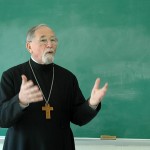by Humbert of Romans
 Because some things in the spectrum of human endeavors do not change. For more on this topic, see
Because some things in the spectrum of human endeavors do not change. For more on this topic, see
Four Characteristics of Good Orthodox Preaching, by Fr. Jonathan Cholcher.
XIX. Qualities of Good Preaching
It is laudable to preach more often when preaching is more necessary. Would it be just to preach daily to religious, if in doing so those who have greater need of preaching were neglected? Did not Our Lord say:
“It is not the healthy who need a physician, but they who are sick” (Matt. 9:12).
It is also more commendable to preach where others have not preached, than to preach where the holy word has often been heard. What kind of gardener is he who neglects the parched sections of the land and irrigates those parts which are well watered?
“But I have not preached this gospel,” said St. Paul, “where Christ has already been named . . . but even as it is written: They who have not been told of him shall see, and they who have not heard shall understand” (Rom. 15:20,21).
It is blameworthy to neglect less populous places, like those who do not like to preach outside the great towns and cities. They have been condemned by Our Lord Jesus Christ Who moved about in the strongholds; that is, in the villages, to teach in the neighborhood (Matt 9:35). Again, like Him, we should make it a rule not to pass through any place without preaching there, as St. Matthew tells us:
“And Jesus was going about all Galilee, teaching in their synagogues, and preaching the gospel of the kingdom” (Matt. 4:23).
It is no longer permitted to keep the word of God from certain classes of men:
“Preach the gospel to every creature” (Mark 16:15)
where the words of Our Lord just before He ascended into heaven.
It is right, however, to prefer those whom we hope to convert, overlooking those whose hearts are hardened; as the Apostles did, when they abandoned the obstinate Jews to turn towards the Gentiles (Acts 13:46). Our Lord Himself had invited them when He said to them:
“Lift up your eyes and behold that the fields are already white for the harvest” (John 4:35),
as though He wished to say: There where the harvest is ready, go, then, and gather it in.
But it is also a duty of the preacher to be more vigorous wherever the malice is greater. When perversity increases, says St. Gregory, preaching must not weaken, but on the contrary, it ought to become more vehement.
All the preceding considerations have been about those to whom we ought to preach, but there are also some which pertain to the preacher himself.
He must carefully avoid giving reason for any opposition that might cause trouble among the clergy and the people, and eventually force him to interrupt his preaching.
It was to prevent such a disorder that St. Paul wrote to the Corinthians that he
“bore all things to avoid raising obstacles to the Gospel of his God” (I Cor. 9:12).
Nevertheless, the preacher should not allow himself to be discouraged easily, like those who abandon preaching at the slightest trouble or obstacle. On this subject St. Paul once wrote to Timothy:
“I charge thee, in the sight of God and Jesus Christ, who will judge the living and the dead by his coming and by his kingdom, preach the word, be urgent in season, out of season . . .” (II Tim. 4:1-2).
He should be careful also to preach not only the word but to preach it with his whole person, like St. John the Baptist who, for this reason, is called a “voice,” because the word was in him completely (Isaiah 40).
In money one takes into account the metal, the stamp and the weight; likewise, in a doctor of the Church one evaluates what he teaches, what he imitates, and what he does. The doctrine is the metal, the example of the Fathers which he follows is the stamp, humility is the weight. Whoever turns aside from duty is no longer precious metal, but only a worthless piece of clay; where formerly he had the sound of pure metal, now he produces no sound at all.
The preacher must persevere in his office and watch that he does not become tired too soon. As one day’s rain does not greatly help a parched land which needs a more plentiful rainfall, so one sermon or a few isolated sermons will not be of great use. This was not the practice of the Savior, of Whom it is written:
“He was teaching daily in the temple” (Luke 19:47).
The preacher should add particular advice to his dogmatic sermons, at all times and in all places, as St. Paul did, and as he says:
“I have declared it to you and taught you in public and from house to house” (Acts 20:20);
and again:
“for three years night and day I did not cease without tears to admonish every one of you” (acts 20:31).
He should understand well the prescriptions of the divine law; for, as a faithful messenger, he must transmit exactly the message he has received.
“Whatever I shall command they, thou shalt speak to them,” the Lord said to Jeremiah (Jer. 1:7).
And who will be surprised at a true preacher being faithful to his recommendation when Balaam said of himself:
“If Balac would give me his house full of silver and gold, I cannot alter the word of the Lord my God, to speak either more or less” (Num. 22:18).
The preacher should speak with fervor, like Apollos of whom it is said:
“Now a certain Jew named Apollos, a native of Alexandria, came to Ephesus. We was an eloquent man, and mighty in the Scriptures. He had been instructed in the way of the Lord, an being fervent in spirit, used to speak and teach carefully whatever had to do with Jesus” (Acts 18:24).
He should speak the truth without fear, especially to sinners, as the Apostles did when they preached the word of God to the Jews with fearlessness; or like Micah who said:
“But yet I am filled with the strength of the spirit of the Lord, with judgment and power: to declare unto Jacob his wickedness and to Israel his sin” (Micah. 3:8).
However, he should know how to temper his speech so as not to offend anyone with over-harsh words.
“Admonish without repulsing,” says St. Ambrose, “and exhort without offending.”
Finally, he will apply himself to everything, as is his duty, in order to fulfill his ministry with all care; otherwise he will not produce great results.
“Use all care,” St. Paul recommends his disciple Timothy, “to present thyself to God as a man approved, a worker that cannot be ashamed,” that is to say, devoted to God’s honor, “rightly handling the word of truth” (II Tim. 2:15).
![]()
This is an excerpt from the Preachers Institute publication:

